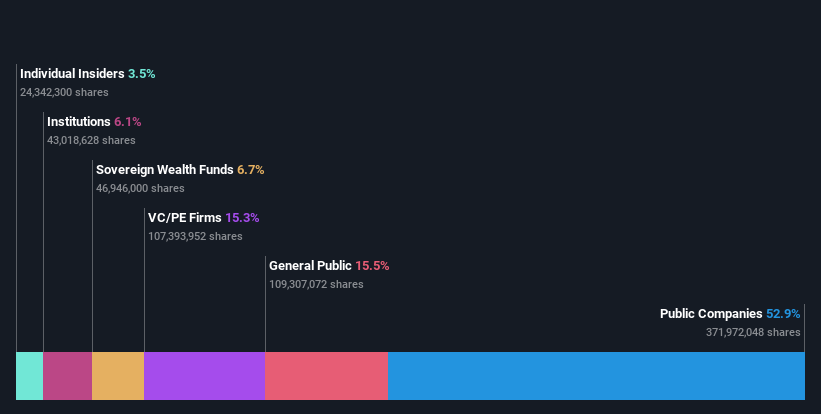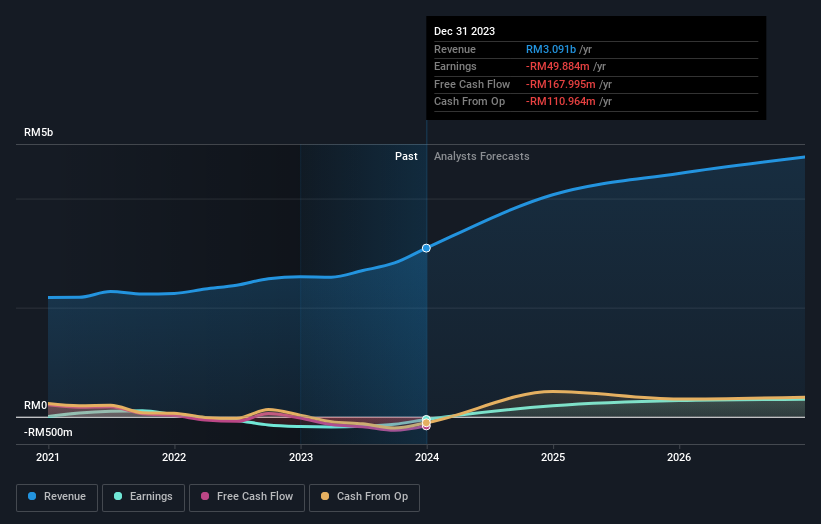Public companies invested in MSM Malaysia Holdings Berhad (KLSE:MSM) copped the brunt of last week's RM288m market cap decline
Key Insights
The considerable ownership by public companies in MSM Malaysia Holdings Berhad indicates that they collectively have a greater say in management and business strategy
The largest shareholder of the company is FGV Holdings Berhad with a 51% stake
Using data from company's past performance alongside ownership research, one can better assess the future performance of a company
If you want to know who really controls MSM Malaysia Holdings Berhad (KLSE:MSM), then you'll have to look at the makeup of its share registry. With 53% stake, public companies possess the maximum shares in the company. In other words, the group stands to gain the most (or lose the most) from their investment into the company.
And last week, public companies endured the biggest losses as the stock fell by 14%.
Let's take a closer look to see what the different types of shareholders can tell us about MSM Malaysia Holdings Berhad.
Check out our latest analysis for MSM Malaysia Holdings Berhad
What Does The Institutional Ownership Tell Us About MSM Malaysia Holdings Berhad?
Institutional investors commonly compare their own returns to the returns of a commonly followed index. So they generally do consider buying larger companies that are included in the relevant benchmark index.
We can see that MSM Malaysia Holdings Berhad does have institutional investors; and they hold a good portion of the company's stock. This implies the analysts working for those institutions have looked at the stock and they like it. But just like anyone else, they could be wrong. It is not uncommon to see a big share price drop if two large institutional investors try to sell out of a stock at the same time. So it is worth checking the past earnings trajectory of MSM Malaysia Holdings Berhad, (below). Of course, keep in mind that there are other factors to consider, too.
Hedge funds don't have many shares in MSM Malaysia Holdings Berhad. Looking at our data, we can see that the largest shareholder is FGV Holdings Berhad with 51% of shares outstanding. This implies that they have majority interest control of the future of the company. With 15% and 6.7% of the shares outstanding respectively, Koperasi Permodalan FELDA Malaysia Berhad and Permodalan Nasional Berhad are the second and third largest shareholders.
While studying institutional ownership for a company can add value to your research, it is also a good practice to research analyst recommendations to get a deeper understand of a stock's expected performance. While there is some analyst coverage, the company is probably not widely covered. So it could gain more attention, down the track.
Insider Ownership Of MSM Malaysia Holdings Berhad
While the precise definition of an insider can be subjective, almost everyone considers board members to be insiders. Management ultimately answers to the board. However, it is not uncommon for managers to be executive board members, especially if they are a founder or the CEO.
Insider ownership is positive when it signals leadership are thinking like the true owners of the company. However, high insider ownership can also give immense power to a small group within the company. This can be negative in some circumstances.
Our most recent data indicates that insiders own some shares in MSM Malaysia Holdings Berhad. In their own names, insiders own RM63m worth of stock in the RM1.8b company. It is good to see some investment by insiders, but it might be worth checking if those insiders have been buying.
General Public Ownership
The general public, who are usually individual investors, hold a 16% stake in MSM Malaysia Holdings Berhad. This size of ownership, while considerable, may not be enough to change company policy if the decision is not in sync with other large shareholders.
Private Equity Ownership
With a stake of 15%, private equity firms could influence the MSM Malaysia Holdings Berhad board. Some investors might be encouraged by this, since private equity are sometimes able to encourage strategies that help the market see the value in the company. Alternatively, those holders might be exiting the investment after taking it public.
Public Company Ownership
It appears to us that public companies own 53% of MSM Malaysia Holdings Berhad. It's hard to say for sure but this suggests they have entwined business interests. This might be a strategic stake, so it's worth watching this space for changes in ownership.
Next Steps:
It's always worth thinking about the different groups who own shares in a company. But to understand MSM Malaysia Holdings Berhad better, we need to consider many other factors. For example, we've discovered 2 warning signs for MSM Malaysia Holdings Berhad (1 shouldn't be ignored!) that you should be aware of before investing here.
Ultimately the future is most important. You can access this free report on analyst forecasts for the company.
NB: Figures in this article are calculated using data from the last twelve months, which refer to the 12-month period ending on the last date of the month the financial statement is dated. This may not be consistent with full year annual report figures.
Have feedback on this article? Concerned about the content? Get in touch with us directly. Alternatively, email editorial-team (at) simplywallst.com.
This article by Simply Wall St is general in nature. We provide commentary based on historical data and analyst forecasts only using an unbiased methodology and our articles are not intended to be financial advice. It does not constitute a recommendation to buy or sell any stock, and does not take account of your objectives, or your financial situation. We aim to bring you long-term focused analysis driven by fundamental data. Note that our analysis may not factor in the latest price-sensitive company announcements or qualitative material. Simply Wall St has no position in any stocks mentioned.

 Yahoo Finance
Yahoo Finance 

